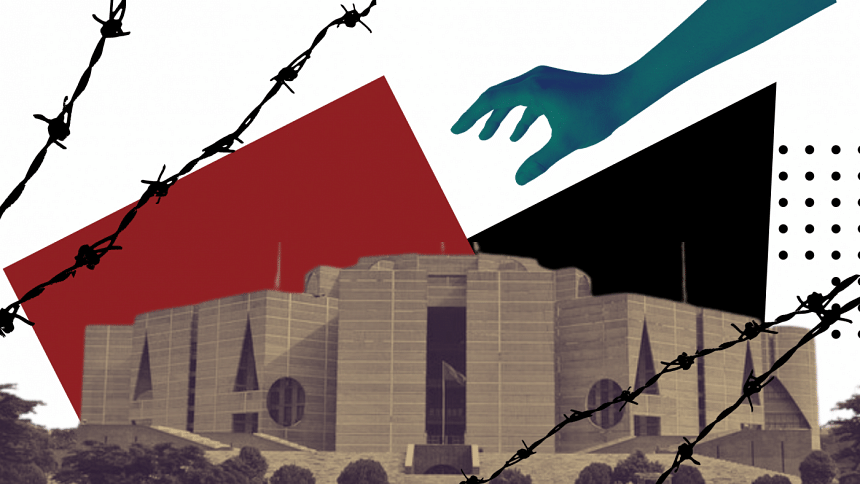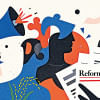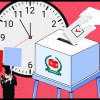Creation of the new political order: Rebuilding ship in an open and turbulent sea

The chatra-janata led mass insurrection has provided us with a historic opportunity to reimagine and reconstitute existing relations between the state and society. The students are now demanding state reform, which is very timely and necessary. But, I believe, we ought to demand more than that. The people, I would argue, need to demand reform of the existing state-society relations as well. The desires and dreams of the youth will never be realised unless we substantively reform existing institutions and create one to govern and mediate relations between the state and society. In place of the hollowed out and purely procedural forms of representative democracy that were practiced by past regimes, we require a more substantive, direct, and deliberative democracy.
The past Awami League regime completely undermined the forms of accountability and checks and balances that characterise a liberal and representative democracy. Since 2014, elections have totally lost effectiveness as a form of direct accountability. Further, the past 15 years of progressively quasi-totalitarian rule by the AL has completely undermined intermediary institutions through which citizens indirectly hold the state accountable—such as parliamentary accountability committees, the judiciary, and the press.
My fundamental concern is about how to make reforms irreversible. This concern stems from the bitter lesson that we learned from the experiences of reforms implemented by the 2007-8 caretaker regime. The caretaker government passed close to 100 acts, ordinances, and laws,and created new institutions which were wiped out within a few weeks by the newly-elected AL government in 2009. The ones retained were captured by party members or hollowed out from within. How do we guarantee that the future ruling party will not do the same?
To address this question, we need to reimagine and reconstitute the state-society relations in two domains: i) representative democracy; and ii) state-society accountability relations. First, we need to re-conceptualise and broaden our definition of democracy. Democracy in Bangladesh has meant representative democracy with a de facto emphasis on its procedures, known as the procedural form of democracy. This form of democracy is in danger of being reduced to pure procedure, without any substance—for example, the rigged elections held by the previous regime. Instead of a hollow procedural democracy, we require a more substantive democracy that emphasises democratic inclusivity and equality and through which we can claim real ownership over the republic, as is proclaimed in the constitution.
We need to imagine more direct forms of citizen engagement, such as periodic referendums and deliberative forums that are discussion-based and non-majoritarian. These forms of direct, deliberative, and substantive democracy will prevent the formation of monopolistic "party-archies" (whereby political parties dominate the political process and civil society), the syndrome of winner-take-all politics, and the resurgence of a dominant party-state (in which, one party calls the shot).
There have been discussions of reforms in the electoral system, such as bi-cameral parliament, proportional representation, and elimination of Article 70 (that deters floor crossing by the parliament members). To these proposals, I would add another more direct democratic option for citizens—the power of constituents to recall their representatives if they are not happy with their performances.
To me, the most critical concern is to guard the guardian, that is to prevent political party elites from capturing accountability institutions. As our past experience shows, the conventional checks and balances imposed by a division of the legislative, executive, and judiciary branches are prone to capture by ruling political elites. The news media, another potential check, can also be captured or subdued. To prevent capture, we need multi-level checks and balances involving multiple stakeholders.
Fundamental institutions and policies should be protected with complex checks and balances mechanisms whereby citizens can exercise veto power at multiple points. Examples of such mechanisms currently under discussion include citizens' commissions for police, banking, education etc., composed of a combination of citizens and state officials.
Beyond such commissions, we need purely societal-based regulatory mechanisms (consisting of citizen members only), for which we have no precedents in Bangladesh. But this is exactly what we need to build to safeguard the achievements of the student movement and to ensure that the reforms remain irreversible in the future.
Such mechanisms would constitute the basis for a dual power and permanent revolution, whereby citizens can maintain a continuous check on state institutions. Our dual power has to be based on a liberal constitutional framework since our context for such innovation is a liberal democratic revolution. These societal based checks and balances with multiple stakeholders and veto points must be endorsed by the constitution—whether a new or highly modified one. Constitutional experts can help with the design.
Such mechanisms, we can call these "Citizens' Committees," may be domain-specific (for example, for education and health sector and police administration) as well as on the basis of administrative tiers (district, upazila, and union parishad). We must understand that, to contain a potential counter revolution, street-based countervailing power, akin to a Maoist cultural revolution, has its limits.We observed, recently, how such power prevented the possibility of a "judicial coup." But over time, these types of pressure tactics will alienate people and there is a potential danger that the revolutionary student leadership might exhaust its current popular legitimacy. There is also a risk that multiple accountability mechanisms might contribute to institutional and policy sclerosis but, I believe, we will learn to remedy such problems with trials and errors.
Given our long history of dictatorship and illiberalism, and political elites' strong incentives to govern through a de facto structure of authoritarian dominant party-state and their loathing for uncertainty inherent in electoral democracy, the utmost necessity is to keep political elites in a narrow corridor by balancing the powers of both state and society. For all these, time is of the essence. The title of this piece—rebuilding the ship in the open and turbulent sea—alludes to a high-risk period for reforming state-society relations, whereby actors, who have lot to lose from these, will be eager to sabotage the process. The ship must not sink.
Reimagining and reconstituting electoral democracy and establishing and sustaining dual power thus keeping the political elites in a narrow corridor—deserve our greatest attention. The rare opportunity that the democratic revolution has presented to us must not be missed.
Dr Mirza Hassan is based at Brac Institute of Governance and Development, Brac University. He can be reached at [email protected]

 For all latest news, follow The Daily Star's Google News channel.
For all latest news, follow The Daily Star's Google News channel. 








Comments